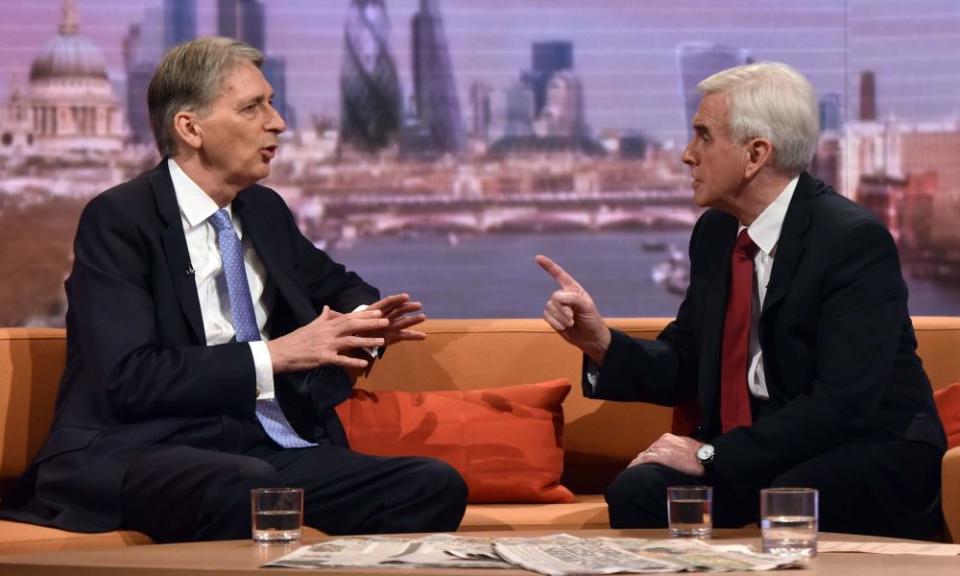Welfare funds must serve 'really disabled' people

The head of Theresa May’s policy unit has been criticised for suggesting welfare spending should prioritise “really disabled people” rather than those with mental health problems, prompting Labour to redouble efforts to reverse controversial changes to disability benefit in next month’s budget.
The Tory MP, George Freeman, said reforms to personal independence payments (PIPs) were needed to stop the government becoming liable for more than £3.6bn, following a ruling by the upper tribunal on Thursday.
Freeman, the MP for Mid Norfolk, said the new rules were “tweaks” rather than cuts and were needed because of “some bizarre decisions by tribunals that now mean benefits are being given to people who are taking pills at home, who suffer from anxiety”.
He told Pienaar’s Politics on BBC 5 Live: “We want to make sure we get the money to the really disabled people who need it.” When challenged about his comments on anxiety, Freeman said: “I totally understand anxiety and so does the prime minister. We’ve set out in the mental health strategy how seriously we take it.”
MPs and disability campaigners expressed outrage at Freeman’s description, with shadow work and pensions secretary Debbie Abrahams saying the MP must “immediately apologise for the comments he made regarding sick and disabled people.” Disability charity Scope criticised Mr Freeman’s “crude” distinction between physical and mental health.
Freeman hit back, saying he suffered himself from “childhood anxiety and depression”, adding in a tweet: “I don’t need any lectures on the damage anxiety does.”
A Number 10 said it was not the language they would have chosen, but stressed the government’s commitment to mental health parity of esteem. “ Nobody will see a reduction in the amount of PIP they were previously awarded by DWP and this update will allow the welfare system to target support at those who need it most,” the source said.
Of the changes, Labour said the government’s equality assessment amounted to cuts in support that disabled people should “rightfully” be able to claim. The shadow chancellor, John McDonnell, has said he will push the Treasury to absorb the cost of the ruling.
MPs will now be asked to legislate to neutralise a tribunal ruling on eligibility for disability support, which would have meant an extra 160,000 people wereeligible for some personal independence payments, including sufferers of dementia and agoraphobia.
The tribunal ruling said claimants whose psychological problems, like agoraphobia, prevented them fromtheir travelling, should get similar levels of assistance to those who are blind. It also found that those who monitored their conditions at home, such as people with diabetes, should also be entitled to PIP.

McDonnell said the announcement about the changes to PIP had been “sneaked out” by the prime minister during the by-election campaigns last Thursday. “Next week the Tories will make out that the economy and the public finances are doing better, however, they are planning to go ahead with a £3.7bn cut to the disabled. This time last year when the economy and public finances were not doing as well, and George Osborne [chancellor at the time] tried to cut PIP, Labour stopped him. And in his U-turn he claimed that he could ‘absorb’ the cost of reversing this cut.”
McDonnell added: “[Philip] Hammond can’t hide from these PIP cuts in his budget. He needs to explain why he can’t absorb them like his predecessor while he is still going ahead with tax giveaways to the very wealthiest in our country.”
The Conservative party chair, Patrick McLoughlin, signalled on Sunday that the government was also not considering any row-back on the planned £3bn cuts to in-work benefits.
“We’ve got to reduce the deficit,” McLoughlin said. “We still have a very big deficit in this country. We’ve got to look at the whole area and we’ve got to reward those people who work, and that’s what we’re doing ... The truth is that we’re spending a lot of money of benefits overall and we need to, as I say, balance the books and get the deficit down.”
Meanwhile, small firms set to be affected by higher business rates, have said they will reduce investment and staff costs following the changes, adding to pressure on the chancellor to use the budget to mitigate the impacts.
The Federation of Small Businesses (FSB) warned of a shock to the growth prospects of smaller firms, some of which it said faced an “unsustainable and unaffordable rise”. The group is one of 17 signatories to a letter opposing the changes sent to the government this month.
The new rates, which come into effect on 1 April, follow a revaluation of property values, which was controversially delayed until after the last election. The FSB said that of almost 700 small firms it had surveyed, about a third expected to see a rise in rates, and that one in five of those faced a 40% increase.
Of the firms surveyed, 55% said that they planned to reduce, postpone or cancel investment in their business because of the higher costs. Some were even considering selling or closing their business.
Mike Cherry, the FSB’s national chair, said the business rates system was an unfair, regressive tax which “hit small firms before they’ve had the chance to make their first £1 in turnover, let alone profit”.

 Yahoo News
Yahoo News 